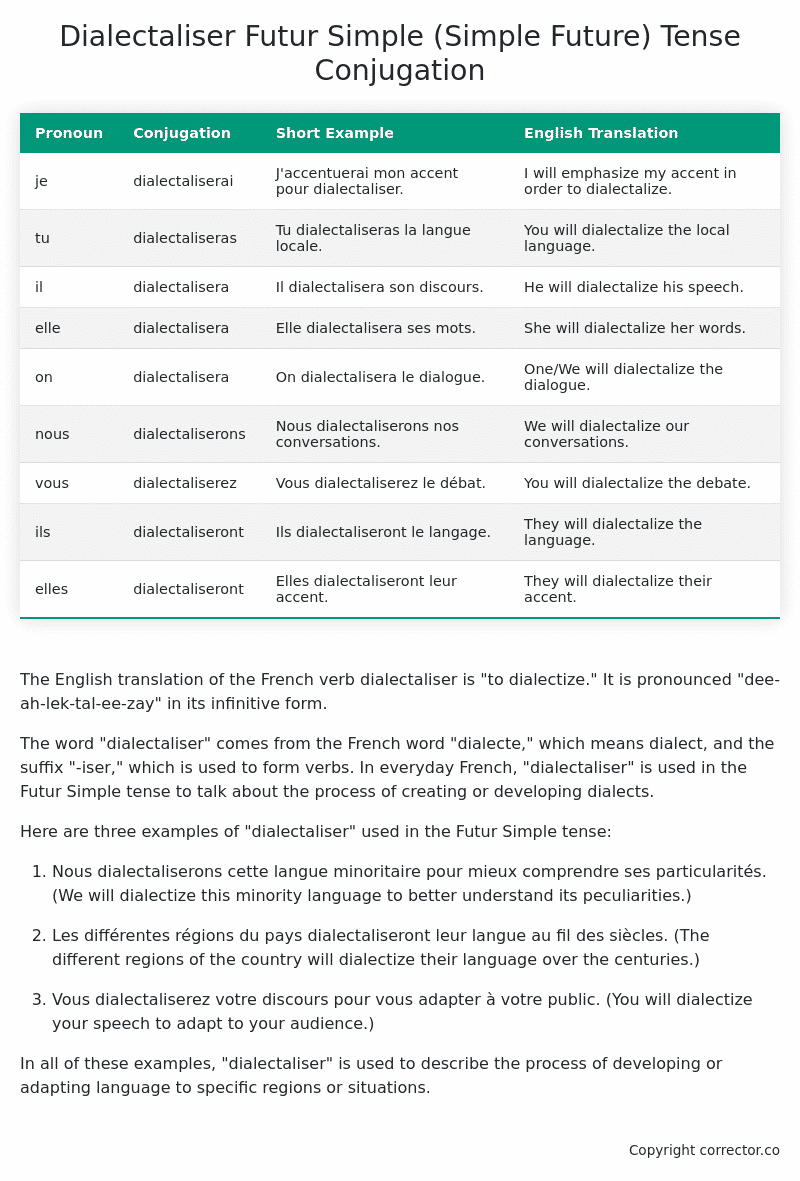Futur Simple (Simple Future) Tense Conjugation of the French Verb dialectaliser
Introduction to the verb dialectaliser
The English translation of the French verb dialectaliser is “to dialectize.” It is pronounced “dee-ah-lek-tal-ee-zay” in its infinitive form.
The word “dialectaliser” comes from the French word “dialecte,” which means dialect, and the suffix “-iser,” which is used to form verbs. In everyday French, “dialectaliser” is used in the Futur Simple tense to talk about the process of creating or developing dialects.
Here are three examples of “dialectaliser” used in the Futur Simple tense:
-
Nous dialectaliserons cette langue minoritaire pour mieux comprendre ses particularités. (We will dialectize this minority language to better understand its peculiarities.)
-
Les différentes régions du pays dialectaliseront leur langue au fil des siècles. (The different regions of the country will dialectize their language over the centuries.)
-
Vous dialectaliserez votre discours pour vous adapter à votre public. (You will dialectize your speech to adapt to your audience.)
In all of these examples, “dialectaliser” is used to describe the process of developing or adapting language to specific regions or situations.
Table of the Futur Simple (Simple Future) Tense Conjugation of dialectaliser
| Pronoun | Conjugation | Short Example | English Translation |
|---|---|---|---|
| je | dialectaliserai | J’accentuerai mon accent pour dialectaliser. | I will emphasize my accent in order to dialectalize. |
| tu | dialectaliseras | Tu dialectaliseras la langue locale. | You will dialectalize the local language. |
| il | dialectalisera | Il dialectalisera son discours. | He will dialectalize his speech. |
| elle | dialectalisera | Elle dialectalisera ses mots. | She will dialectalize her words. |
| on | dialectalisera | On dialectalisera le dialogue. | One/We will dialectalize the dialogue. |
| nous | dialectaliserons | Nous dialectaliserons nos conversations. | We will dialectalize our conversations. |
| vous | dialectaliserez | Vous dialectaliserez le débat. | You will dialectalize the debate. |
| ils | dialectaliseront | Ils dialectaliseront le langage. | They will dialectalize the language. |
| elles | dialectaliseront | Elles dialectaliseront leur accent. | They will dialectalize their accent. |
Other Conjugations for Dialectaliser.
Le Present (Present Tense) Conjugation of the French Verb dialectaliser
Imparfait (Imperfect) Tense Conjugation of the French Verb dialectaliser
Passé Simple (Simple Past) Tense Conjugation of the French Verb dialectaliser
Passé Composé (Present Perfect) Tense Conjugation of the French Verb dialectaliser
Futur Simple (Simple Future) Tense Conjugation of the French Verb dialectaliser (this article)
Futur Proche (Near Future) Tense Conjugation of the French Verb dialectaliser
Plus-que-parfait (Pluperfect) Tense Conjugation of the French Verb dialectaliser
Passé Antérieur (Past Anterior) Tense Conjugation of the French Verb dialectaliser
Futur Antérieur (Future Anterior) Tense Conjugation of the French Verb dialectaliser
Subjonctif Présent (Subjunctive Present) Tense Conjugation of the French Verb dialectaliser
Subjonctif Passé (Subjunctive Past) Tense Conjugation of the French Verb dialectaliser
Subjonctif Imparfait (Subjunctive Imperfect) Tense Conjugation of the French Verb dialectaliser
Conditionnel Présent (Conditional Present) Tense Conjugation of the French Verb dialectaliser
Conditionnel Passé (Conditional Past) Tense Conjugation of the French Verb dialectaliser
L’impératif Présent (Imperative Present) Tense Conjugation of the French Verb dialectaliser
L’infinitif Présent (Infinitive Present) Tense Conjugation of the French Verb dialectaliser
Struggling with French verbs or the language in general? Why not use our free French Grammar Checker – no registration required!
Get a FREE Download Study Sheet of this Conjugation 🔥
Simply right click the image below, click “save image” and get your free reference for the dialectaliser Futur Simple tense conjugation!

Dialectaliser – About the French Futur Simple (Simple Future) Tense
Formation of Futur Simple
For regular -er verbs (e.g., parler – to speak)
For regular -ir verbs (e.g., finir – to finish)
For regular -re verbs (e.g., vendre – to sell)
Common Everyday Usage Patterns
Conditional Statements
Interactions with Other Tenses
Futur Antérieur
Conditional
Present
Summary
I hope you enjoyed this article on the verb dialectaliser. Still in a learning mood? Check out another TOTALLY random French verb conjugation!


